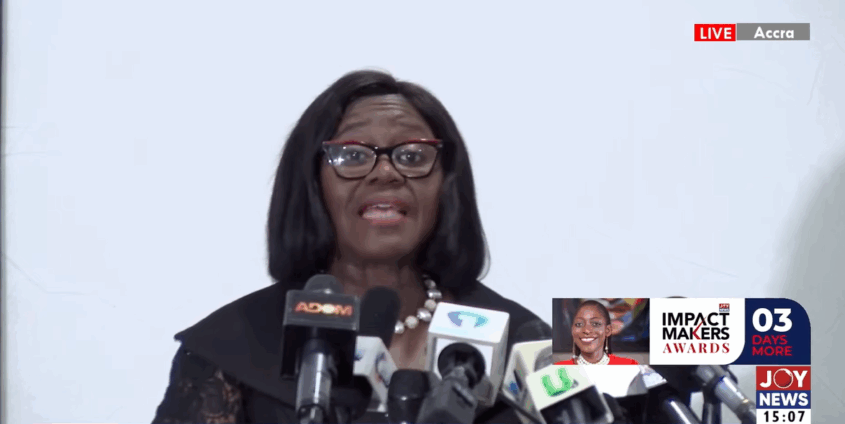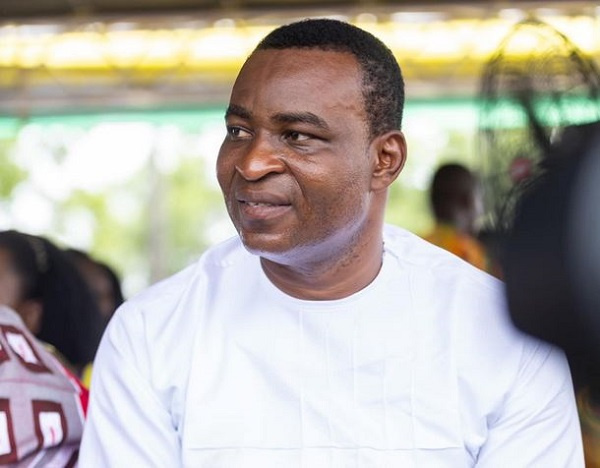Suspended Ghanaian Chief Justice Gertrude Araba Esaaba Sackey Torkornoo on Wednesday alleged that the ongoing process to remove her from office is fraught with grave constitutional and legal violations, according to a press conference on Wednesday.
According to her this marks the first time in Ghana’s 68-year history as an independent republic that a Chief Justice has faced such a hearing.
Chief Justice Torkornoo expressed profound disappointment, stating that the removal process, rather than serving as a guiding precedent for nation-building, is instead “breaking every rule on how justice is delivered in the country”.
She warned that the implications of this process extend far beyond her situation, potentially impacting the removal procedures for all superior court judges and heads of independent constitutional bodies in the future.
The Chief Justice emphasised that the framers of the 1992 Constitution intended these officials to serve without fear of reprisal from influential individuals, the executive, or the legislature, ensuring freedom and justice for Ghanaian citizens.
Allegations of Flagrant Irregularities and Illegalities
The Chief Justice detailed a litany of alleged irregularities and illegalities plaguing the proceedings:
• Denied Public Hearing: Despite her application to the Supreme Court for an open hearing, her request was refused, and a supplementary affidavit detailing human rights violations she had already encountered was struck from the record at the Attorney-General’s request. She believes the mandated secrecy of such proceedings is being exploited as a “cover up for any agenda”.
• Procedural Breaches: Justice Torkornoo cited the committee’s refusal to recognize her counsel’s presence on the first day of proceedings and its subsequent decision to fix hearing dates without involving her legal team. She further alleged the committee failed to specify the particular allegations for which a prima facie case had been established, hindering her ability to prepare an adequate defense.
• Prevented Cross-Examination: Alarmingly, she stated that the committee permitted two of the petitioners, Mr. Daniel Ofori and a group calling itself “Shining Stars,” not to testify, thereby denying her the opportunity to cross-examine them on their petitions.
• Denial of Basic Rights & Intimidation: The Chief Justice recounted being denied the opportunity to have her husband or a close family member present during the hearing , and subjected to “thorough search[es] on my body and handbags in violation of protocols and courtesies”.
• Controversial Venue: She highlighted the decision to conduct hearings in a “cordoned high security zone on Castle Drive, Osu” – the Adu Lodge – instead of a judicial facility, noting its historical connection to the 1981 murder of judges, one of whom was her uncle. She explicitly stated, “Was Adu Lodge chosen for this inquiry to make me feel insecure? I think so”.
• Breach of Disclosure Rules: Critically, the committee has reportedly refused to provide her with copies of the petitions that form the basis of the hearing, her own responses to the President, or the President’s prima facie determination. She explained that this leaves her lawyers to “guess which allegations” are being referred to during witness testimonies.
• Misapplication of Rules: Justice Torkornoo asserted that the committee is conducting the hearing as an “adversarial litigation” using the High Court (Civil Procedure) Rules 2004 (CI 47), instead of the Commissions of Inquiry (Practice and Procedure) Rules, 2010 (C.I. 65), which is designed for inquiries under Article 146(7). This, she argued, means there are “no agreed claims, no agreed defences, and no agreed issues that the inquiry is supposed to establish”. She also criticized the committee for allowing petitioners to issue subpoenas without testifying themselves, a power she claims the committee does not possess.
Refusal to Resign Amidst Threats and Political Agenda
Chief Justice Torkornoo addressed persistent suggestions that she should resign or retire , unequivocally stating that such an action is “not an option any Judge or public official is even allowed to have” under Article 146 proceedings. She warned that resigning would lead to a judgment based on potentially “false claims” and the loss of all entitlements. She suggested that efforts might be aimed at frustrating her into resignation “so that the architects of the scheme can go back into the media to say that the wild and unfounded allegations in the petitions were not defended because they were true”.
“If I resign under these circumstances, I will be saying that this flawed, unknown and opaque process is acceptable. It is not,” she declared. As a lawyer of 38 years and a judge of 21 years, she considers it her “onerous duty and obligation to speak up concerning the administration of justice in this country”.
Addressing the Petitions
The Chief Justice systematically refuted the allegations contained in the three petitions:
Mr. Daniel Ofori’s Petition: She clarified that his complaints regarding case transfers were due to a judge’s family crisis and standard judicial policy. She pointed out a conflict of interest, as Justice Pwamang, who ruled in Ofori’s favor in a previous case, is chairing the committee investigating Ofori’s petition against her. She dismissed claims of misappropriating funds for travel and per diems, providing evidence that her actions were within her conditions of appointment and official policy. She also refuted allegations about accountable imprest and administrative staff matters, stating records were provided to the President showing due process.
Mr. Ayamga Akolgo’s Petition: This petition alleged she ordered his arrest. The Chief Justice stated that his own exhibit, a media report, contradicted his claim, suggesting he was taken out for shouting in court. She again highlighted Justice Pwamang’s conflict of interest and cited Article 127(3) of the Constitution, which indemnifies judges for judicial acts.
“Shining Stars” Petition: She stated that this unregistered group complained about her judicial conduct in a specific case. Justice Torkornoo reiterated that no judge sits alone in the Supreme Court and decisions are collective, with all judges indemnified by Article 127(3).
Chief Justice Torkornoo concluded by issuing a dire warning: “If this nation descends into the kind of proceedings behind closed doors, that break all the rules of adjudication or inquiry as we know them… that descent will lead us to a place where no Judge, Commissioner or Head of an independent constitutional body will be safe from compromise created by fear, intimidation, and threats, or a desire to please”.
She expressed confidence in her integrity, stating no one can accuse her of taking a bribe, and vowed to continue fighting to prove the “wild and unfounded allegations” are untrue. Enditem
Source: Ghana Eye Report
Share Us


